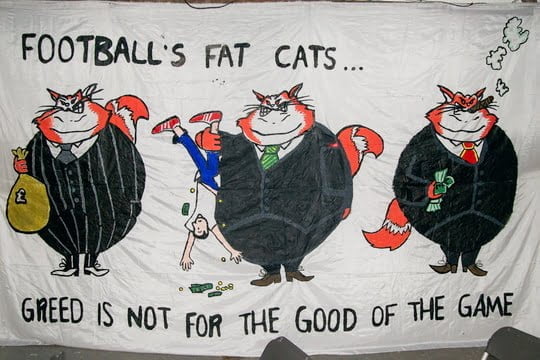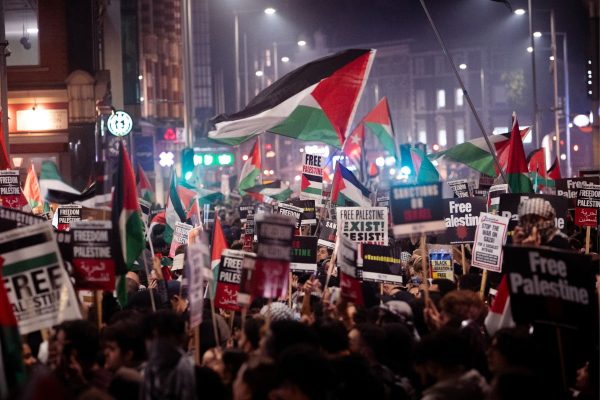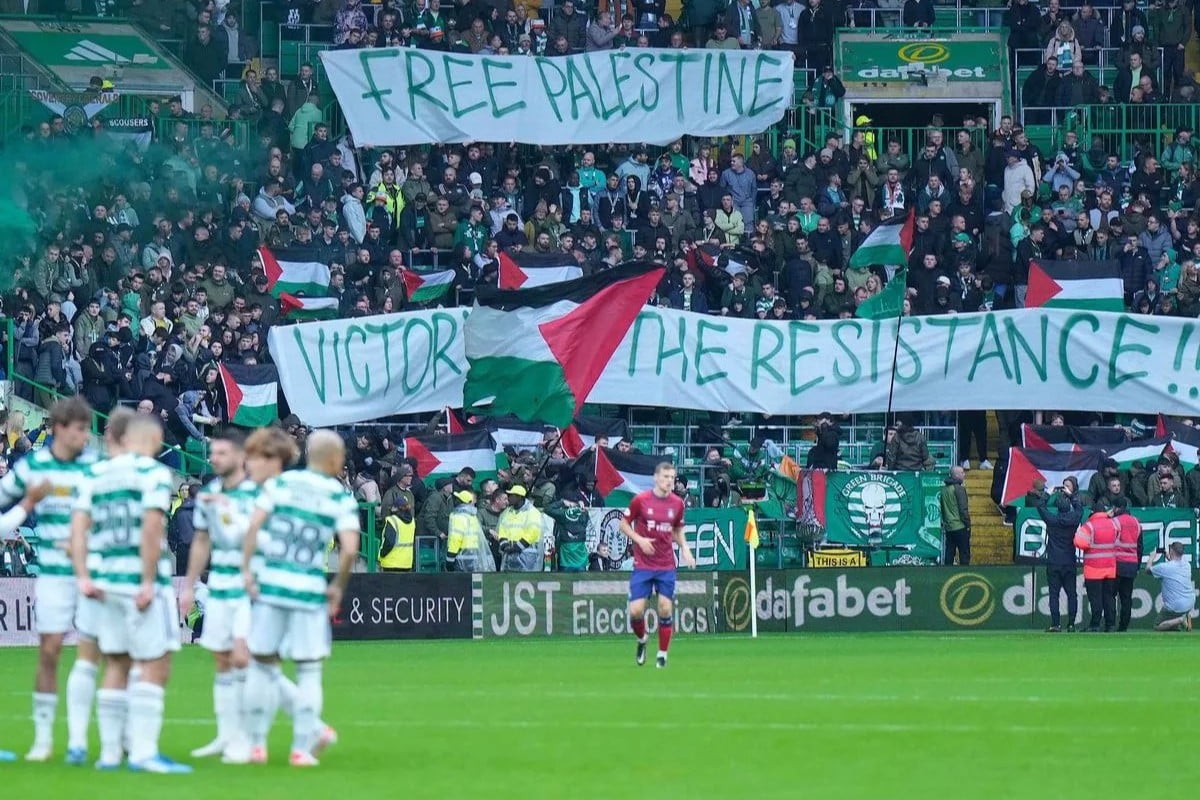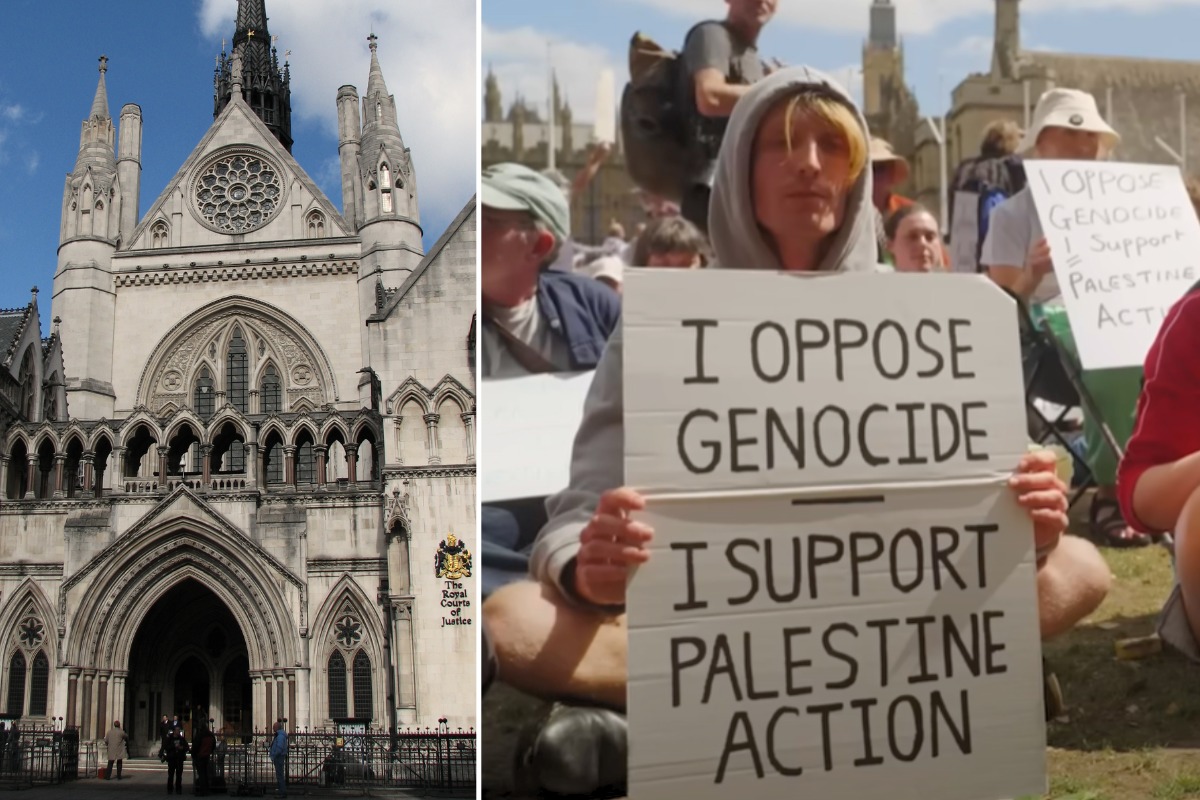Ever since the events of 7 October, the British establishment has condemned pro-Palestine supporters as ‘terrorist sympathisers’ and ‘antisemites’, while justifying Israel’s indiscriminate bombing campaign against the people of Gaza as ‘self-defence’.
With mainstream media outlets all singing from the same imperialist hymn sheet, ordinary people across the length and breadth of the country have sought other means of expressing solidarity with their Palestinian brothers and sisters – including football terraces.
All over Europe, football stadiums have provided a platform for fans to voice their rejection of the ruling class’ narrative. Support for Palestine has echoed out across the continent: from Basque clubs Osasuna and Real Sociedad, to the stands of Italian side Livorno.
Of all these grassroots gestures against western imperialism, few have caught the world’s attention like that of Celtic FC’s Green Brigade.
No amount of deft camerawork could avoid showing the sea of Palestine flags covering the entirety of Celtic Park, as the home team emerged from the tunnel before its UEFA Champions League group stage match against Atlético Madrid on 25 October.
Celtic FC 🇵🇸💚 pic.twitter.com/C64r775woY
— 𝕄𝕠𝕙𝕒𝕞𝕖𝕕 🇵🇸 (@MHQ4K) October 25, 2023
For the following 90 minutes, the corner of the stadium occupied by the Green Brigade was adorned with the distinctive red-black-white-green flag – a reminder of where Celtic supporters stand on this issue: on the side of the oppressed.
This act of solidarity served its immediate purpose. Images from Parkhead immediately grabbed global headlines.
Bosses’ diktats
The club’s corporate chiefs were quick to retaliate, however.
Keen to keep the ‘beautiful game’ free of controversy, on behalf of big business sponsors, UEFA regulations prohibit the display of “illicit political flags”. And toeing this line, Celtic bosses attempted to dissuade supporters from bringing “banners, flags, and symbols relating to the conflict” into the ground.
With fans refusing to abide by these diktats, the Celtic board subsequently imposed an indefinite ban on Green Brigade members, excluding them from all of the team’s upcoming fixtures.

The club insists that the ban does not, in fact, relate to the group’s support for the Palestinian people. Instead, they refer to a trumped-up list of disciplinary breaches attributed to the Green Brigade, dating back months before the aforementioned Champions League tie.
With a complete lack of substantiating evidence, however, and taking into account the Celtic hierarchy’s record for routinely undermining the supporters they purport to represent, it does not require a great leap of the imagination to see that the timing of these sanctions is no mere coincidence.
Just a few weeks prior, the club published a risible statement distancing themselves from a Green Brigade display that read: ‘Free Palestine. Victory to the Resistance.’ In this, the board suggested that such sentiments “do not represent the views of Celtic Football Club”.
This mealy-mouthed response was met with the sight of further Palestine flags at every end of the stadium: a reminder that the only people who should decide a club’s values are the fans, upon whose support the team depends.
Supporters vs shareholders
The arrogance and hypocrisy of the Celtic board is unfortunately commonplace in British football.
As capitalism tightens its grip on the game, severing the bonds between football clubs and the communities that founded them, the interests of supporters are increasingly being subordinated to the interests of shareholders.
Those pushing this corporate takeover have attempted to sanitise and whitewash modern football, with establishment figures arguing that ‘politics does not belong in sport’.
Yet supporters of clubs like Celtic have a long history of struggling against oppression. So when the board tells fans to ‘keep politics out of Parkhead’, such orders are treated with the level of derision they deserve.

After all, this is the same board that opportunistically continues to fly the Irish flag from the top of Celtic Park – a commemoration of the club’s origins, rooted in the colonial displacement of the Great Famine.
The right to fly said flag was steadfastly defended by the club’s directors when the Scottish Football Association attempted to have it removed – on completely sectarian grounds – back in 1952.
And scarcely a single match at Celtic Park passes by without a rendition of the Irish folk standard ‘Let the People Sing’ blasting through the official PA system.
Of course, what Celtic bosses have demonstrated is not that matches should exist in a political vacuum (as if this were even possible). Rather, they have merely demanded that any ‘politics’ must take place on their terms, in their interests.
And a cursory glance at the rogue’s gallery that runs the club – including everyone from venture capitalists to Labour politicians – reveals clearly whose interests this means.
Establishment hypocrisy
When one holds a mirror up to UEFA, the situation appears even more absurd. The governing body of European football has previously meted out fines to Celtic as a result of their supporters’ political stance.
The most well-known instance bears a striking parallel to the present debacle. Back in 2016, the Green Brigade incurred an £8,000 fine for displaying Palestine flags – ‘illicit political banners’, in UEFA parlance – before a game against an Israeli side.
But this example only highlights UEFA’s rank hypocrisy when it comes to ‘kicking politics out of football’. As Celtic fans noted at the time, including a team from the Middle East in a European competition is an entirely political statement.
At the time, the Green Brigade launched a campaign against UEFA’s decision, pledging to raise every penny demanded by European football chiefs, and offering to donate this money to charities providing aid relief in Palestine.
This initiative accumulated more than £170k for the Palestinian cause, demonstrating the widespread solidarity that exists within the working class.
Crisis off the pitch
It is still unknown how much the fan group’s latest act of defiance will cost the club. The board of directors currently remain deadlocked with two of the club’s largest supporter blocs.
But already, the Green Brigade is seeking to link this debate with the wider movement for Palestinian freedom. This includes calls for a ‘day of action’, should the situation remain unresolved by the time Celtic return from the international break with their match against Motherwell on 25 November.

Fans’ frustrations are echoed across society. Ordinary workers and youth are disgusted by the brutality of the Israeli war and occupation, and by the hypocritical position of the establishment back home.
As for Celtic, they currently sit atop the Scottish Premiership, unbeaten at the time of writing. But the team’s run of form will not save the club from experiencing crises off the pitch, as the bosses may hope. Celtic is not a football club that subsists on results alone.
The board of directors would do well to heed the words of the club’s legendary centre-half Tommy Burns: “Playing for Celtic is not just playing for a football club; it is playing for a people and a cause.”
Community control
Fans of all teams should put aside their sporting rivalries, and unite to demand the immediate reinstatement of the Green Brigade, along with any supporters persecuted for taking a political stand.
Such a campaign should be linked to the struggle against the rampant cronyism and big business pressure operating at the highest level of the sport, and in turn to the question of club ownership and control. The goal must be to kick capitalism out of football.
This means fans organising, mobilising, and fighting for control of the clubs that they have built, and which should exist to represent the interests of them and their working-class communities – not those of the billionaire class.






